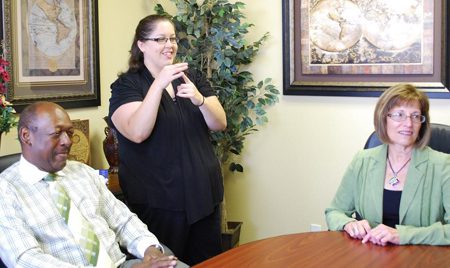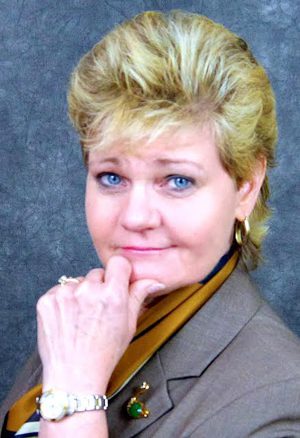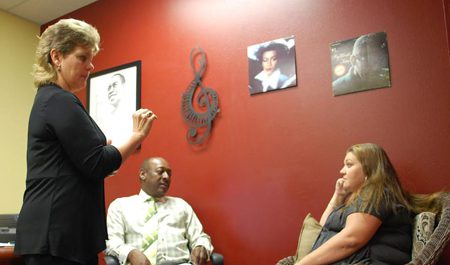

Largely enabled by the advances in technology and resources, deaf entrepreneurs interested in taking on the challenge of starting a new company have more options than ever.
With technology, deaf entrepreneurs can start their own business, whether it’s an accounting firm, a bakery down the street or even a yoga studio, without few complications, according to Marilyn L. Weber, president and CEO of Deaf Interpreter Services, which provides nationwide professional, nationally-certified sign language and oral interpreters, video remote interpreting (VRI), support services, video/audio production and consulting.
Weber, who is a certified sign language interpreter and has an adult daughter who is deaf, has worked for more than 25 years promoting accessible communication, and advocating for the rights of the deaf community. She has interpreted in thousands of professional situations, and conducts deaf awareness workshops, cultural diversity training, and ADA Compliance Consulting.
Broadband communication is ubiquitous in a way it wasn’t just 10 years ago, and it’s currently more affordable than ever. During the same time period, new tools for video communication have not only come on the market, but the Federal Communications Commission has delegated their availability as part of existing phone networks. As a result, technology has helped to cut the cost and difficulty of communicating for the entire deaf community.
The rapid evolution of technology in the workplace within the past decade began with fax machines and teletypewriters, and is quickly becoming a thing of the past with the emergence of video relay services, or VRS, and video remote interpreting, or VRI.
As a result of these resources, the number of deaf-owned businesses have almost doubled in just the last decade, from 600 to nearly 1,000. With a myriad of deaf-specific organizations at hand and willing to help, there has never been a more appropriate time for deaf entrepreneurs to take the leap and start a business.
 Both the fax machine and teletypewriter were used prior to the early 90s, and were often slow – as well as unreliable – when sending messages. Communication sent via fax machines and teletypewriters were required to be written and sent in English, thus often resulting in large communication and knowledge gaps between sender and receiver. This is because, contrary to popular belief, English is generally a second (or even a third!) language for most of the deaf community, following sign language.
Both the fax machine and teletypewriter were used prior to the early 90s, and were often slow – as well as unreliable – when sending messages. Communication sent via fax machines and teletypewriters were required to be written and sent in English, thus often resulting in large communication and knowledge gaps between sender and receiver. This is because, contrary to popular belief, English is generally a second (or even a third!) language for most of the deaf community, following sign language.
Thanks to the ease of use and access of high-speed internet, VRS allows the deaf community to make calls with the simple click of a few buttons. The process consists of the deaf individual using a VRS to initiate a video phone call, which instantaneously connects them with a communications assistant – who is fluent in both sign language and English. The assistant then dials the party that the deaf individual requests and serves as a two-way interpreter for the call.
Video remote interpreting is another great service that has developed and expanded along with technology. Similar to VRS, VRI doesn’t require any additional equipment other than an internet connection and a webcam. Differing from VRS, VRI is generally used to assist two or more people in the same location to converse. Hospitals and doctor’s offices are two examples of businesses that might use this service regularly. For example, if a deaf patient enters an emergency room, the VRI will assist in summoning an interpreter who understands sign language and can assist with the urgent matter at hand. VRS and VRI have become available due to the vast development of broadband internet services.
The internet is also widely used as a quick research tool to retrieve necessary information, supplies and interpreters when needed. With just a few short clicks, an interpreter can be of assistance to any deaf or hard-of-hearing individual in need. Organizations such as the Deaf Entrepreneurs of America Foundation offer assistance for the deaf community who aspire to become business owners. The foundation also provides adequate education to other companies about how to provide services for deaf and hard-of-hearing individuals.



